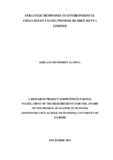| dc.description.abstract | Organizations conduct their business in the environment. The environment provides organizations with inputs which are transformed to outputs through internal processes and these outputs are given back to the environment. To survive in the environment, organizations should adopt strategies that are compatible with their strategic goals and objectives to effectively accommodate changes in the external environment. The seed sector in Kenya has been confronted by many challenges in the recent past, forcing industry players to device strategies for survival and continuity. The objective of the study was to determine the strategic responses to environmental challenges facing Pioneer Hi-Bred Kenya Limited, a Kenyan subsidiary of a multinational seed company. The research adopted a case study approach and interview guide was used for collection of data. Content analysis was used to analyze data which was qualitative in nature. The study established that the company faces numerous environmental challenges such as; effects of globalization and market liberalization, climate change, invasive pests and diseases, land fragmentation, regulatory and policies challenges, seed storage constraints and leadership challenges. Research findings were that the company had put in place strategic responses to counteract the challenges it was facing. The response strategies employed includes; Leveraging its global genetic pool to access novel germplasm for breeding competitive seed varieties; Using latest breeding technique to produce climatically adaptable and resilient maize varieties that can withstand pest and disease pressure. The company has a research and development centre that is fully funded by its parent company. It also acquired Pannar Seed Kenya Limited, a move aimed at expanding its genetic bank and expand its product range to grow market share. Further, the company was using industry trade associations and advocacy platforms to lobby government on critical policy and regulatory issue that negatively impacts its business. The study concludes that Pioneer Hi-Bred Kenya Limited has put in place appropriate strategic responses to environmental challenges it was currently facing. It recommends that Pioneer Hi-Bred Kenya Limited should diversify its product range and mix, introduce value added services to its customers, outsource non-core operations and aggressively scale up in country seed production to enjoy economies of scale. The limitations of the study are that, the scope is restricted to response strategies to environmental challenges facing Pioneer Hi-Bred Kenya Limited rather the entire seed sector in Kenya. In order to a abide by the non-disclosure policies of the company, some respondents were giving general information to avoid exposing the company to competitors. The study concludes that more research is required to understand response strategies employed by all actors in the Kenyan seed industry to mitigate against environmental challenges they face. Further research on strategy implementation within the seed industry is required. | en_US |



